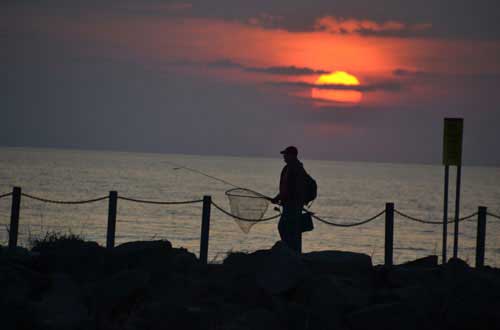DEC will discuss trout and salmon fisheries at ‘State of Lake Ontario’ meetings
Press Release, NYS Department of Environmental Conservation

Photo by Tom Rivers: A fisherman walks on west side pier at the Oak Orchard Harbor in this photo from May 3, 2015.
The public will have the opportunity to learn about the State of Lake Ontario fisheries at public meetings to be held in Niagara, Monroe, Oswego and Schenectady counties in March.
“Lake Ontario and its tributaries provide world-class angling opportunities that are generating substantial recreational and economic benefits to towns and cities along the lake,” said Basil Seggos , DEC commissioner. “The State of Lake Ontario meetings provide an excellent opportunity for everyone interested in the lake to interact with the scientists who study and manage its fisheries.”
New York’s Lake Ontario waters comprise more than 2.7 million acres. The open lake, embayments and tributaries support thriving populations of sportfish, including trout, salmon, bass, walleye, yellow perch and panfish. A recent statewide angler survey estimated more than 2.6 million angler days were spent on Lake Ontario and major tributaries, resulting in an estimated economic value of $112 million annually to local communities.
The meeting dates and locations are:
Monday, March 4: 6:30 – 9 p.m. at the Rochester Institute of Technology campus (Chester F Carlson Center for Imaging Science), Rochester, Monroe County. The meeting is co-hosted by RIT and the Monroe County Fishery Advisory Board.
Thursday, March 7: 6:30 – 9 p.m. at the Cornell Cooperative Extension Building, 4487 Lake Ave., Lockport, Niagara County. The meeting is co-hosted by Niagara County Cooperative Extension and the Niagara County Sportfishery Development Board.
Thursday, March 14: 6:30 – 9 p.m. at SUNY Schenectady County Community College, Stockade Building, Room 101, 78 Washington Ave., Schenectady, Schenectady County.
Tuesday, March 19: 6:30 – 9 p.m. at the Pulaski High School auditorium, 4624 Salina St., Pulaski, Oswego County. The meeting is co-hosted by the Eastern Lake Ontario Salmon and Trout Association.
Staff from DEC and the United States Geological Survey will make a number of presentations, including updates on the status of trout and salmon fisheries in the lake and its tributaries, forage fish, and stocking programs.
The meetings will provide ample time at the end of the scheduled program for the audience to ask questions and interact with the presenters. Information about DEC’s Lake Ontario fisheries assessment programs can be found on the DEC’s website.
For further information contact Christopher Legard, NYSDEC Lake Ontario Unit Leader at the Cape Vincent Fisheries Research Station, (315) 654-2147.






























































